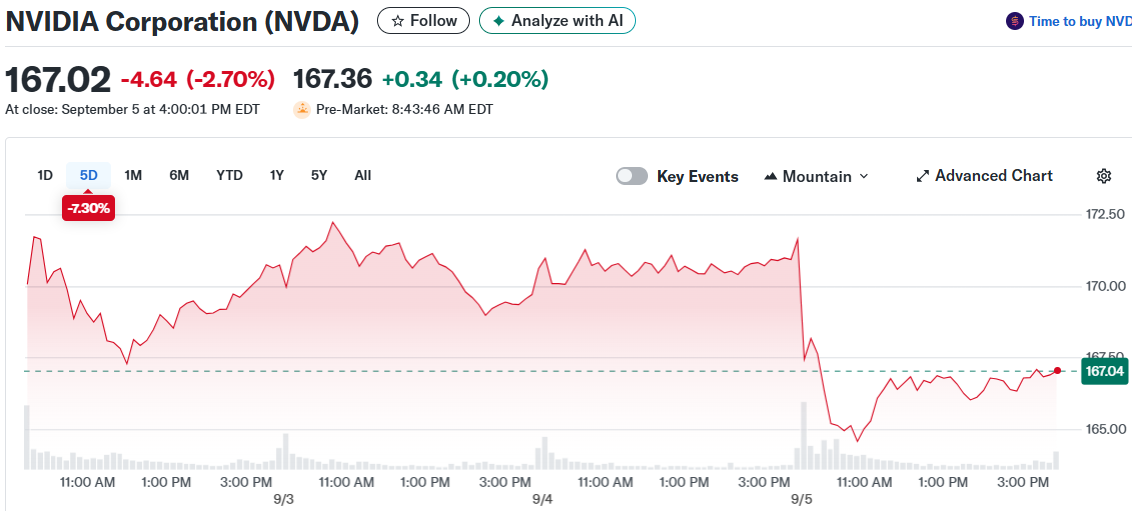TLDR
- Citi reduced Nvidia price target from $210 to $200 on Broadcom competition fears
- Potential $12 billion sales loss to Broadcom’s new customer deals
- NVDA down 8% over past month despite 0.6% premarket recovery
- China market restart could provide upside but timing uncertain
- 35 of 39 analysts maintain Buy ratings with $211.41 average target
Nvidia stock climbed 0.6% to $168.07 in premarket trading Monday after Citi analyst Atif Malik cut his price target. The reduction from $210 to $200 reflects growing concerns about competitive pressure from Broadcom.

Despite the lower target, Malik maintained his Buy rating on NVDA stock. The move comes as Nvidia shares have declined 8% over the past month following earnings disappointment and increased competition.
Friday’s 2.7% drop pushed the stock lower before Monday’s premarket recovery. Investors continue weighing competition risks against the broader AI spending boom.
Broadcom Deals Pose $12 Billion Revenue Risk
Broadcom recently reported strong results and announced new customer agreements. These deals suggest clients plan to shift toward Broadcom hardware instead of Nvidia’s graphics processing units.
Citi estimates these customer wins could cost Nvidia up to $12 billion in future sales. The threat represents a direct challenge to Nvidia’s dominance in AI chip markets.
Broadcom stock surged 9.41% as investors recognized the competitive implications. The company appears positioned to capture market share from Nvidia’s established customer base.
Advanced Micro Devices gained 0.4% in premarket trading. AMD offers another alternative for companies seeking AI chip solutions beyond Nvidia.
China Market Adds Uncertainty
Nvidia faces additional uncertainty from suspended China operations. GPU shipments to Chinese customers remain stalled due to export restrictions.
Citi noted that restarting China shipments could provide upside potential. However, geopolitical tensions make the timing of any restart unclear.
The Chinese market represents massive revenue opportunity for AI chip suppliers. Nvidia must currently navigate without this significant income stream.
Policy changes could quickly alter the China situation. But investors cannot rely on near-term resolution of export restrictions.
Meta CEO Mark Zuckerberg offered positive commentary over the weekend. He suggested Meta might invest more than $600 billion in U.S. AI infrastructure through 2028 if progress accelerates.
Such spending levels would benefit the entire semiconductor sector. Nvidia would likely capture substantial portions of this investment given its market position.
J.P. Morgan analysts remain optimistic about AI spending trends. They believe monetary conditions support continued sector investment despite Nvidia’s specific challenges.

Wall Street maintains confidence in NVDA stock long-term prospects. Among 39 analysts tracked over three months, 35 recommend buying shares.
Only three analysts suggest holding positions. Just one recommends selling the stock.
The average 12-month price target reaches $211.41. This implies 26.58% upside potential from current trading levels.
Nvidia stock recovered in premarket sessions after Friday’s decline, showing resilience despite competitive pressures and analyst downgrades.





